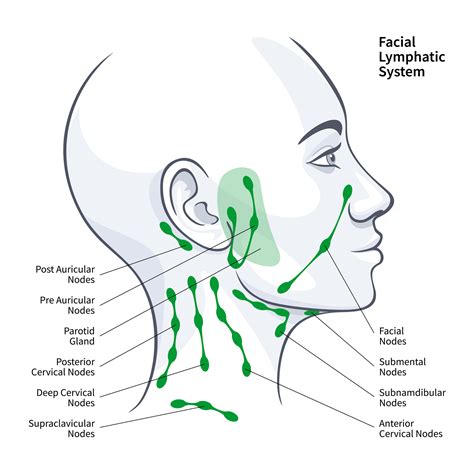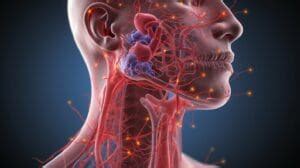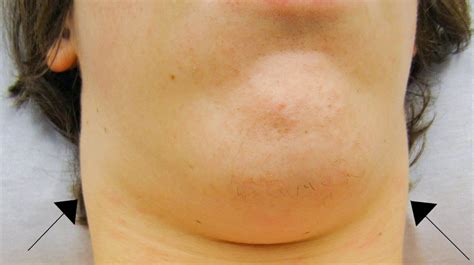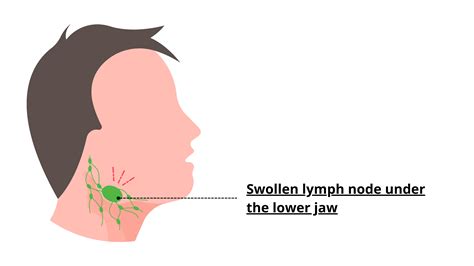Intro
Discover 5 key jaw lymph nodes facts, including functions, locations, and health implications, to understand lymph node swelling, cancer risks, and overall neck and throat well-being.
The lymph nodes in the jaw area play a crucial role in our body's immune system. These small, bean-shaped structures are responsible for filtering lymph fluid, trapping pathogens, and activating the immune response. In this article, we will delve into the world of jaw lymph nodes, exploring their functions, importance, and interesting facts.
The jaw lymph nodes are part of a larger network of lymph nodes located throughout the body. They are situated in the neck and jaw area, and their primary function is to protect the body from infection and disease. The lymph nodes in the jaw area are responsible for draining lymph fluid from the face, neck, and scalp, making them a vital part of our immune system.
The importance of jaw lymph nodes cannot be overstated. They help to prevent the spread of infection and disease, and they play a critical role in the body's immune response. Without functioning lymph nodes, our body would be more susceptible to illness and disease. In this article, we will explore the fascinating world of jaw lymph nodes, covering topics such as their location, function, and importance.
Jaw Lymph Nodes Location and Function

The submandibular lymph nodes are located under the jawbone and are responsible for draining lymph fluid from the face and neck. The submental lymph nodes are located under the chin and are responsible for draining lymph fluid from the lower lip and the floor of the mouth. The parotid lymph nodes are located near the parotid gland, which is responsible for producing saliva, and they are responsible for draining lymph fluid from the scalp and the face.
Importance of Jaw Lymph Nodes
The jaw lymph nodes are essential for our body's immune system. They help to filter lymph fluid, trap pathogens, and activate the immune response. Without functioning lymph nodes, our body would be more susceptible to illness and disease. The jaw lymph nodes also play a critical role in the prevention of cancer, as they help to detect and eliminate cancer cells.In addition to their role in the immune system, the jaw lymph nodes also play a role in the prevention of infection. They help to trap bacteria, viruses, and other pathogens, preventing them from spreading to other parts of the body. The jaw lymph nodes also help to reduce inflammation and promote healing, making them an essential part of our body's defense system.
Jaw Lymph Nodes and Cancer

When cancer cells are present in the jaw lymph nodes, it can be a sign that the cancer has spread from its original location. This is known as metastasis, and it can make treatment more challenging. The jaw lymph nodes can also be affected by lymphoma, a type of cancer that originates in the lymph nodes.
Treatment of Jaw Lymph Nodes Cancer
Treatment of cancer in the jaw lymph nodes depends on the type and stage of the cancer. Surgery, radiation therapy, and chemotherapy are common treatments for cancer in the jaw lymph nodes. In some cases, a combination of these treatments may be used.Surgery to remove the affected lymph nodes is often the first line of treatment. This can help to prevent the spread of cancer and reduce the risk of recurrence. Radiation therapy can also be used to kill cancer cells in the jaw lymph nodes. Chemotherapy may be used to treat cancer that has spread to other parts of the body.
Jaw Lymph Nodes Swelling and Infection

Symptoms of swollen jaw lymph nodes can include pain, swelling, and tenderness in the neck and jaw area. In some cases, swollen lymph nodes can be a sign of a more serious underlying condition, such as cancer or an autoimmune disorder.
Treatment of Jaw Lymph Nodes Swelling
Treatment of swollen jaw lymph nodes depends on the underlying cause. Antibiotics may be prescribed to treat bacterial infections, while antiviral medications may be used to treat viral infections. In some cases, surgery may be necessary to remove the affected lymph nodes.It is essential to seek medical attention if you experience symptoms of swollen jaw lymph nodes. A healthcare professional can diagnose the underlying cause and provide treatment to reduce swelling and prevent complications.
Jaw Lymph Nodes and Dental Health

Good oral hygiene practices, such as brushing and flossing, can help to prevent infection and reduce the risk of swollen jaw lymph nodes. Regular dental check-ups can also help to detect and treat dental problems before they become more serious.
Importance of Regular Dental Check-ups
Regular dental check-ups are essential for maintaining good oral health and preventing infection. A dentist can examine the teeth and gums, detect signs of infection or disease, and provide treatment to prevent complications.In addition to regular dental check-ups, good oral hygiene practices can help to prevent infection and reduce the risk of swollen jaw lymph nodes. This includes brushing and flossing regularly, using an antibacterial mouthwash, and avoiding sugary and acidic foods and drinks.
Jaw Lymph Nodes and Overall Health

A healthy lifestyle, including a balanced diet, regular exercise, and adequate sleep, can help to support the immune system and reduce the risk of illness and disease. Avoiding stress, getting enough rest, and practicing good hygiene can also help to support the immune system and maintain overall health.
Importance of a Healthy Lifestyle
A healthy lifestyle is essential for maintaining overall health and supporting the immune system. A balanced diet that includes plenty of fruits, vegetables, and whole grains can help to provide the necessary nutrients and antioxidants to support immune function.Regular exercise can also help to support the immune system, reducing the risk of illness and disease. Getting enough sleep, practicing good hygiene, and avoiding stress can also help to support the immune system and maintain overall health.
What are the symptoms of swollen jaw lymph nodes?
+Symptoms of swollen jaw lymph nodes can include pain, swelling, and tenderness in the neck and jaw area.
How can I prevent infection and reduce the risk of swollen jaw lymph nodes?
+Good oral hygiene practices, such as brushing and flossing, can help to prevent infection and reduce the risk of swollen jaw lymph nodes. Regular dental check-ups can also help to detect and treat dental problems before they become more serious.
What is the treatment for cancer in the jaw lymph nodes?
+Treatment of cancer in the jaw lymph nodes depends on the type and stage of the cancer. Surgery, radiation therapy, and chemotherapy are common treatments for cancer in the jaw lymph nodes. In some cases, a combination of these treatments may be used.
In conclusion, the jaw lymph nodes play a critical role in our body's immune system, and their importance cannot be overstated. By understanding the location, function, and importance of the jaw lymph nodes, we can take steps to maintain good oral health and reduce the risk of illness and disease. If you have any questions or concerns about the jaw lymph nodes, we encourage you to comment below or share this article with others. By working together, we can promote overall health and well-being, and reduce the risk of complications related to the jaw lymph nodes.
